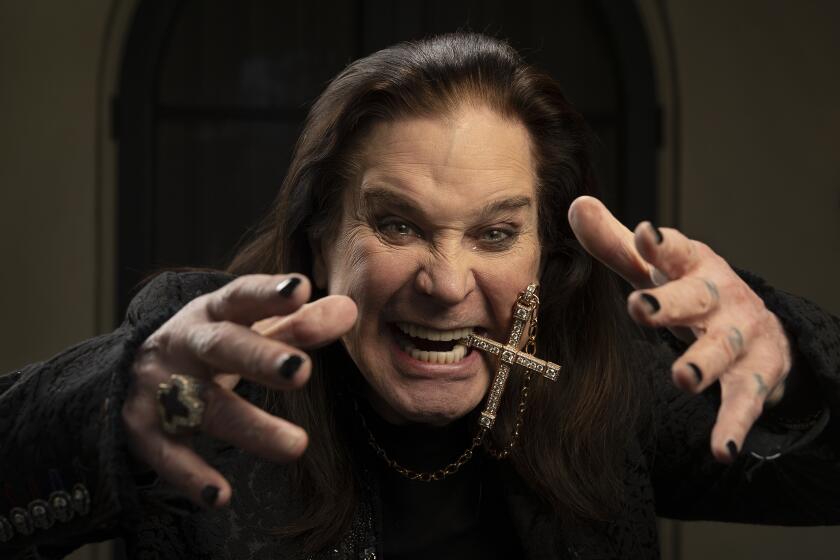Doolittle Proves a Fairy Godfather to the Joffrey : Dance: Impresario has enabled the company to perform the Prince-scored ‘Billboards’ at the Music Center in July by financing the upfront costs.
- Share via
The announcement Monday that the Joffrey Ballet would return to the Dorothy Chandler Pavilion in July for five performances of its new full-evening rock ballet “Billboards” caught the arts community off guard.
Just four months ago, the company was unable to meet financial conditions to return to the Music Center to perform “The Nutcracker.” It seemed to be the final chapter in the relationship between the Joffrey and the Music Center, which had ousted the financially troubled dance troupe as a resident company in 1991.
The Joffrey had subsequently adopted the Wiltern Theatre as its new home. But the company canceled what was to have been its first engagement there following last year’s riots, and the Joffrey and the Wiltern have since been embroiled in a lawsuit over losses incurred because of the cancellation. The Joffrey thus found itself without a local venue to perform “Billboards,” its much-vaunted work with music by rock star Prince, which was conceived during the Joffrey’s last repertory season at the Music Center.
Now, however, James A. Doolittle and his Southern California Theatre Assn. have assumed presenting responsibilities for the Joffrey’s July 21-25 engagement at the Music Center--and, everyone concerned agrees, his involvement makes all the difference.
“We made a decision a year ago to be very conservative economically and perform as much as possible in presented engagements rather than assume the financial risk (of self-presentation),” said Joffrey executive director C.C. Conner in a phone interview Wednesday.
“We are in a break-even (condition) for the current year, with more upcoming tour dates for the ‘93-94 season than in the past few years,” he said. “However we still have our ($2-million) accumulated deficit and it’s a very tough economy. So we’re not self-presenting anywhere in the current season.”
Doolittle, however, is willing to take the risk. Saying in a phone interview Tuesday that he’s “always admired the company and thought it was creative and fresh,” Doolittle agreed to present the Joffrey in “Billboards” on the basis of a performance videotape, early reviews and conversations with people who saw it. The full-length ballet premiered two months ago in Iowa and has since been performed in Chicago. (An engagement in San Francisco will precede the Los Angeles dates.) “It’s very hard to do something new and different in ballet,” said the veteran arts presenter, who filled the Music Center’s empty dates last December with the Kirov Ballet version of “The Nutcracker.”
At 75, he might seem an unlikely candidate to produce the first ballet with music by Prince, but his career as local impresario has embraced everything from the Grand Kabuki of Japan to the Supremes.
Doolittle describes the Joffrey arrangement as “a one-shot, a purchase of their show for Los Angeles. We usually give the company an underwriting (of all its costs) and, if it goes over a certain gross, they get additional funds. They have no problem.”
He also deals with Music Center demands for deposits, guarantees or pledges--exactly where the Joffrey “Nutcracker” negotiations collapsed in 1992. At that time, the Music Center Operating Company wanted an upfront payment of $200,000 from the company.
However, former Joffrey executive committee chairman Michael Tennenbaum said, “the board was preoccupied with making next week’s payroll, not next season’s indemnity and we very reluctantly said, ‘We’re sorry.’ ” Doolittle said he offered to advance the Joffrey $100,000 at that time (taking a percentage of the box-office gross for repayment), but the remaining amount still couldn’t be raised.
At this point, Doolittle said, “Billboards” contracts haven’t yet been signed, but he expects Music Center demands for a deposit to be “$25,000 to $30,000. . . . Whatever they ask, we’re going to send it in. It’s just a guarantee we’re going to play. And they hold the money.”
Sandra Kimberling, president of the Music Center Operating Company, says the small number of performances scheduled and the use of taped music explains the low advance payment demanded for this engagement. “If the Joffrey was coming (to self-present), they wouldn’t have to put up more than Doolittle,” she said. But she also acknowledged Doolittle’s reputation: “We know his financial stability.” In what Conner calls “a very tough economy for all arts organizations,” it’s vital to have an old-fashioned theatrical angel on board as well as a Prince.
More to Read
The biggest entertainment stories
Get our big stories about Hollywood, film, television, music, arts, culture and more right in your inbox as soon as they publish.
You may occasionally receive promotional content from the Los Angeles Times.










